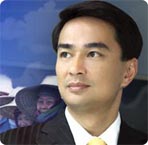Thai prime minister says downturn could be worse than 1997
 Bangkok - Thais must be resilient going into what could be a very rough 2009, Prime Minister Abhisit Vejjajiva said Friday.
Bangkok - Thais must be resilient going into what could be a very rough 2009, Prime Minister Abhisit Vejjajiva said Friday.
Workers should not engage in disruptive protests against their employers which "unwittingly exacerbate economic woes by undermining business confidence," he said after a meeting with Democrat Party chief advisor, former prime minister Chuan Leekpai.
This warning comes after a spate of protests by workers who, in some cases, have blocked main roads after factory owners resisted pay and bonus demands. Farmers' groups have also protested against falling commodity prices. Abhisit said "orderly and peaceful" protests were legitimate ways of calling attention to grievances.
The government will early next week unveil a package of spending measures to support the rapidly slowing economy. Abhisit said the economic numbers for next year appeared even more alarming than in 1997 during the Asian economic crisis, Thailand's Nation newspaper reported.
Thailand's economy is widely expected to slow to a virtual standstill next year, if not actually shrink. Although the 1997 currency crash bankrupted a swath of Thai businesses, the global market remained quite robust.
This time two central props of the Thai economy - exports and tourism - are wobbling alarmingly. Exports fell for the first time in six years in November by 18.6 per cent and tourist arrivals in December may be down to a third of the number predicted.
Abhisit said the government's priority would be saving jobs and easing the plight of the unemployed. The spending boost of 300 billion baht (8.7 billion dollars), or 3 per cent of the gross domestic product (GDP), could kick in as early as March, he added.
Tourism minister Chumpol Silpa-Archa said on Thursday the government plans a 15.6-billion-baht package of measures to revive the tourist industry, which has been hard hit by the week-long closure of Bangkok's two airports by activists at the end of November.
If the idea that Thailand's economic problems are partly self-inflicted gains currency, this may hurt Abhisit's awkward political position, say political analysts.
His Democrat Party was able to form a five-party coalition only after months of protests by anti-Thaksin militants and Bangkok elites, ending with a court's decision to dissolve Thaksin's party for electoral fraud.
Many voters in rural areas are thought to be bitter over the political demolition of the former telecoms tycoon whose populist handouts and dynamic personality won many converts.
Thailand has not had a fully functioning government since the September 2006 military coup that ousted Thaksin. The last short-lived government was forced to hold cabinet meetings in obscure locations to avoid protestors. (dpa)